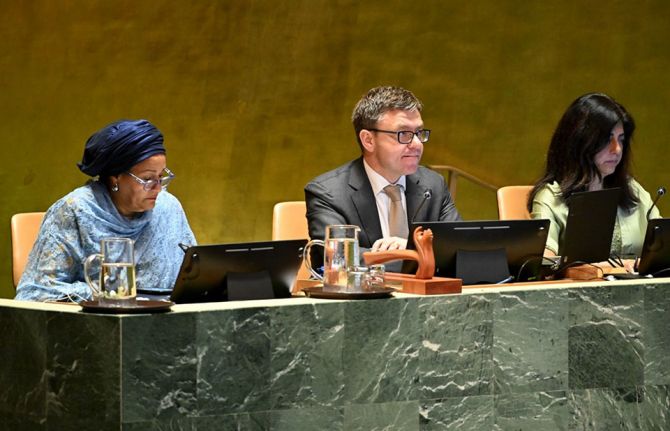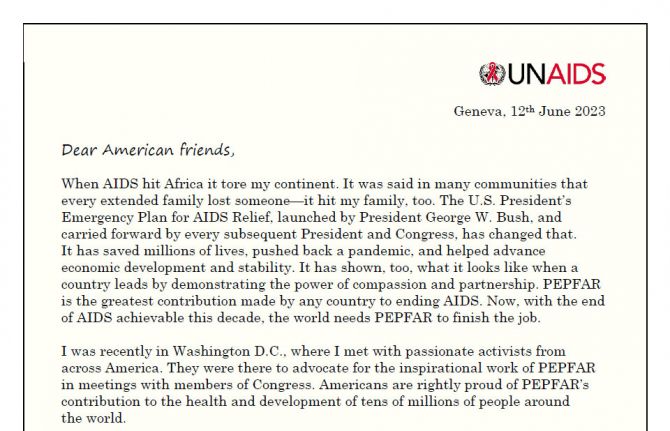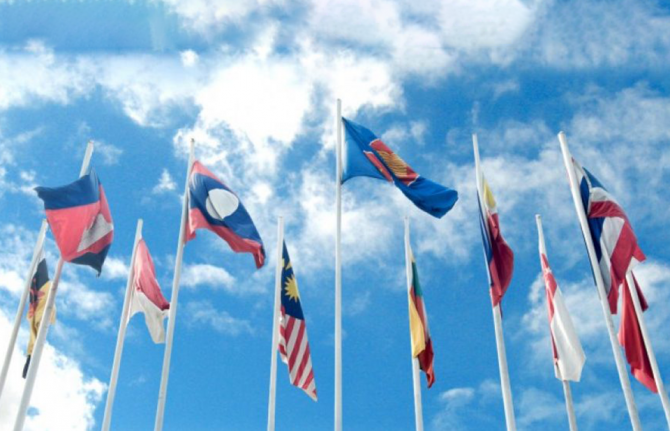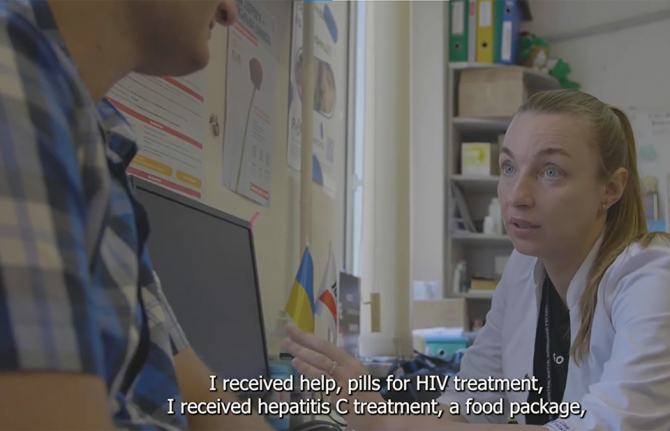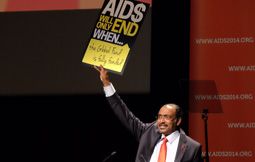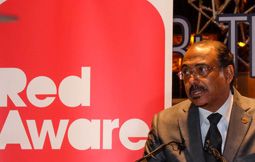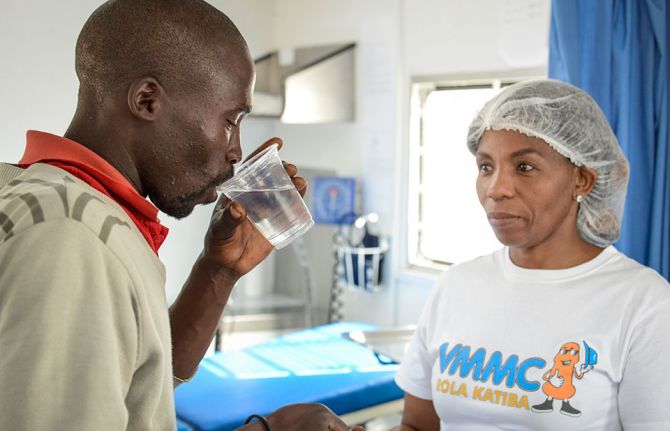
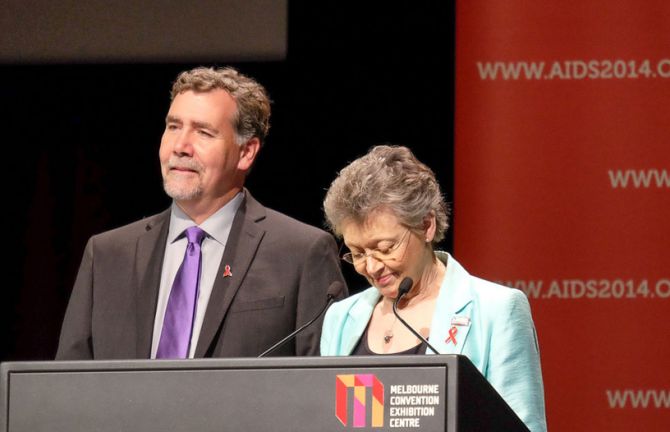
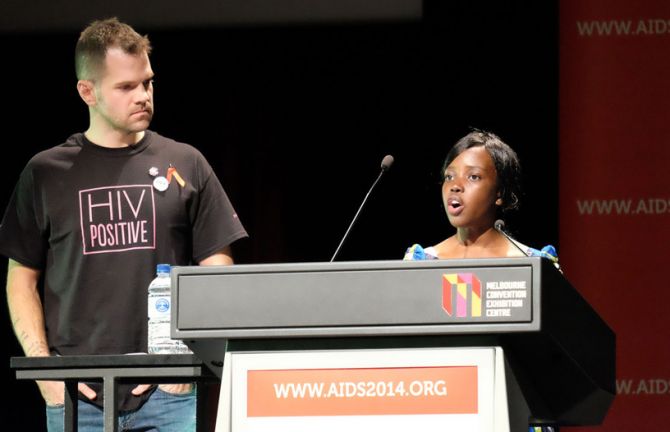
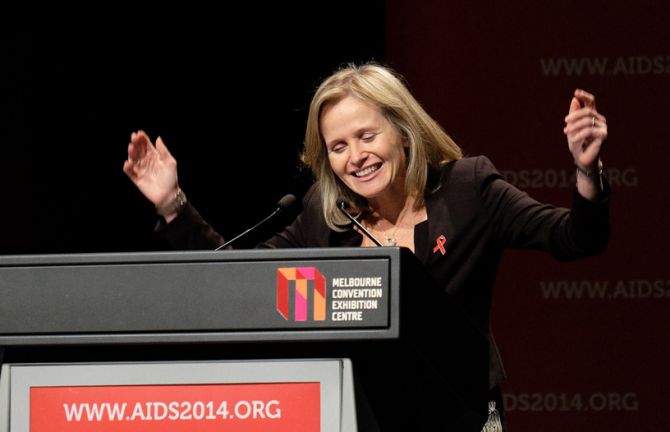
Update
AIDS 2014 closes in Melbourne
25 July 2014
25 July 2014 25 July 2014No one can be left behind if the AIDS epidemic is to come to an end by 2030. This was one of the main messages of the 20th International AIDS Conference, which closed in Melbourne, Australia, on 25 July.
Remembering the tragic events of the flight MH17 disaster, at the closing ceremony tributes were paid to the delegates tragically killed on their way to the conference.
AIDS 2014 concluded with a general sense that, despite all the progress made to date, the social determinants of the epidemic still need to be addressed. Existing punitive laws and stigma and discrimination were identified as some of the main barriers to bringing the epidemic under control. Catering for the needs of adolescents and key populations at higher risk of infection was identified as important for an effective response to AIDS, as well as focusing programmes in the geographical areas where most new HIV infections occur.
The closing ceremony saw addresses being made by prominent advocates in the global HIV response, including musician and advocate Bob Geldof, John Manwaring, an Australian representing people living with HIV, and outgoing and incoming Presidents of the International AIDS Society, Françoise Barré-Sinoussi and Chris Beyer, respectively.
At the end of the closing session, the conference was handed over to officials representing the organizing committee of the 21st International AIDS Conference, which will be held in Durban, South Africa, in 2016.
Quotes
"If the past has taught us anything, it's that silence equals death. We do need to speak up. We are more powerful than we know it. It doesn't require any special talent. It requires one simple thing—honesty."
"The tragic events of last week have infused in all of us a renewed feeling of unity."
"Let's commit to gathering in Durban and be able to say we have made significant improvement in the treatment and prevention of AIDS."
"There is a great sense of triumph, commitment and vindication that you are on the last gasp on the journey to ending AIDS."
Related

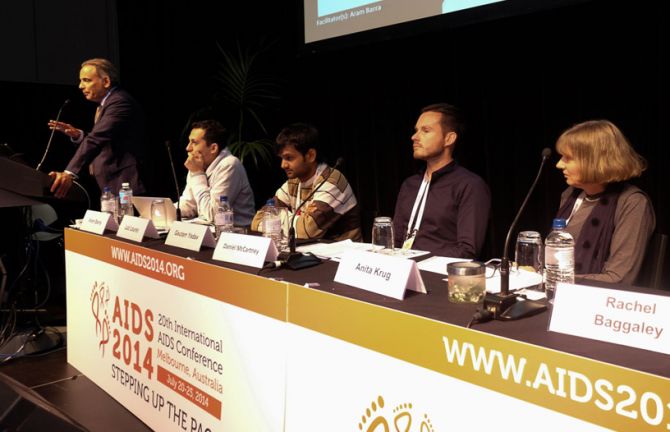


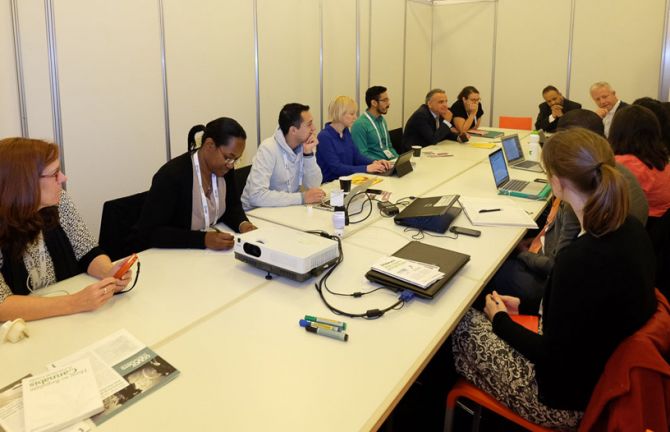
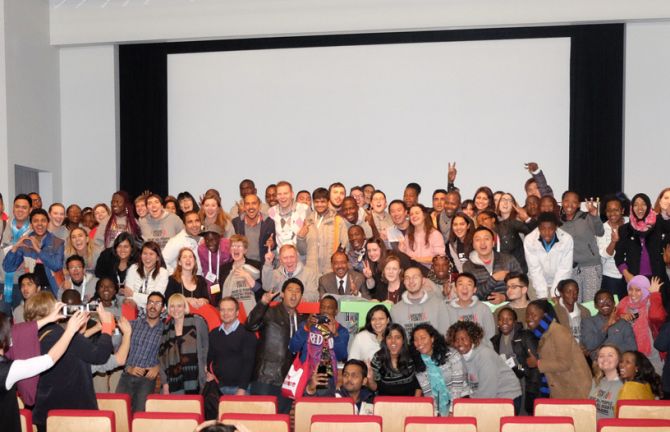
Update
Challenging parental consent laws to increase young people’s access to vital HIV services
23 July 2014
23 July 2014 23 July 2014There remain serious challenges in reaching the world’s adolescents with HIV, sexual and reproductive health and harm reduction services. The situation is especially worrying given that this is the only age group in which AIDS-related deaths are increasing, and AIDS-related deaths are the number two contributor to global adolescent mortality.
A session at the International AIDS Conference in Melbourne, Australia, on 23 July explored one of the key barriers preventing young people from accessing interventions: the need for parental consent before they are allowed to benefit from services such as HIV counselling and testing and needle–syringe programmes. The session heard that in sub-Saharan Africa, for example, at least 33 countries had age-based or other specific criteria for consenting to HIV testing and counselling.
While acknowledging that parents, guardians and the state have an obligation to protect young people from harm, participants discussed adolescents’ evolving capacity to independently consent to accessing potentially life-saving programmes. Daniel McCartney, of the International Planned Parenthood Federation and a member of the pact for social transformation, a coalition of 26 youth-led organizations, supported by UNAIDS, presented the findings of a global online youth survey on parental consent laws and requirements at the session.
It was found in the survey that 72% of respondents said laws requiring parental consent were not a good way of involving their parents in decision-making about their sexual and reproductive health and harm reduction. Thirty-eight per cent said that they have not always been able to access relevant services without restrictions when they needed them, a situation that left them feeling discriminated against and disempowered.
Participants agreed to use the results of the survey to advocate for countries to review their policies on age-related legal, regulatory and social barriers to specific health services and to strive to ensure that young people feel empowered and in charge of their own sexual health and well-being.
Related

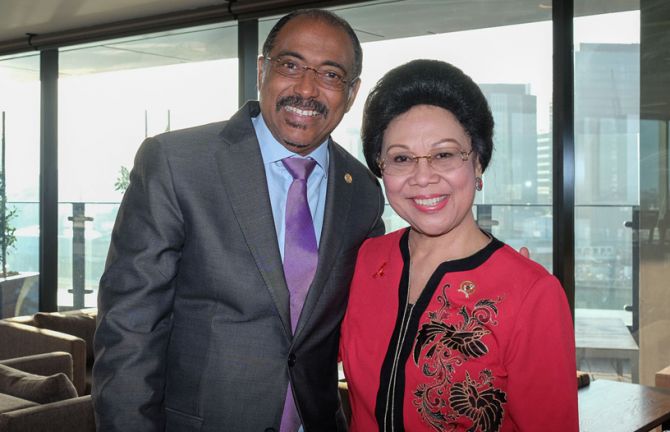
UNAIDS Executive Director Michel Sidibé with the Minister of Health of Indonesia Nafsiah Mboi. Melbourne, Australia, 22 July 2014.
Feature Story
Countries stepping up
23 July 2014
23 July 2014 23 July 2014At the 2014 International AIDS Conference in Melbourne, Australia, one of the questions being asked is: “Where should the world focus its attention in the AIDS response?”
In the recent Gap report, UNAIDS highlighted the importance of location and population. The report shows that 15 countries account for more than 75% of the 2.1 million new HIV infections that occurred in 2013. The countries—Brazil, Cameroon, China, India, Indonesia, Kenya, Mozambique, Nigeria, Russian Federation, South Africa, Uganda, United Republic of Tanzania, United States of America, Zambia and Zimbabwe—can all make a positive impact by scaling up HIV services where they are most needed to reduce new HIV infections.
This was one of the issues highlighted by the UNAIDS Executive Director, Michel Sidibé, when he met with Nafsiah Mboi, the Minister of Health of Indonesia—which is working to increase access to HIV testing and early treatment—at the conference.
“I know that Indonesia can quickly change the trajectory,” said Mr Sidibé. “The government is committed and has the capacity to accelerate scale-up and I expect we will see the results soon.”
Countries often face multiple epidemics and hence there is an increased urgency to focus at the city and district level in order to effectively reach the people currently being left behind.
“Countries with the highest burden have to do the heavy lifting to end the AIDS epidemic and provide services to all affected people—location by location, population by population,” said Mr Sidibé.
Populations at higher risk of HIV infection are often difficult to reach. India has sustained investments in key populations for more than a decade and expanded outreach in more than a thousand locations within the country. In the Russian Federation, despite clear scientific evidence of the impact of harm reduction services, very few people who inject drugs have access to opioid substitution therapy and needle–syringe programmes.
Brazil, which has been a pioneer in the AIDS response, has recently seen HIV infections rise among young gay men and other men who have sex with men. Health authorities and civil society groups in Brazil are exploring innovative new ways to get life-saving information and treatment to a new generation of young men who may not know they are at higher risk of becoming infected.
In Mozambique, new data analysis shows that the districts with the highest density of people living with HIV are located along transport corridors and in important seaports in the central and southern regions of the country, and the country is now beginning to expand access to HIV services in these areas.
In Nigeria, a similar analysis led to a focus on 13 states, including the Federal Capital Territory, which includes Abuja, for intensifying scale-up. South Africa, the country with the largest number of people living with HIV, has made significant gains in stopping the AIDS epidemic. A national HIV testing campaign, combined with intense civil society engagement, led to more than 2.5 million people having access to antiretroviral therapy.
“This is why the exchange of ideas is so important,” said Mr Sidibé. “When we can share data and best practices, we can close the programmatic gaps.”
Related

Update
UNICEF and Katy Perry launch video against stigma and discrimination
22 July 2014
22 July 2014 22 July 2014On 22 July, UNICEF, along with Katy Perry, released the #ShowYourLove video, made to help dispel the stigma and discrimination that too often surrounds HIV, especially for adolescents, and that is preventing access to HIV testing and treatment. Intended to celebrate life and love, the video imagines a world free of AIDS in which adolescents do not face inequality, exclusion, stigma or discrimination. This initiative also uses the #Zerodiscrimination hashtag, which is part of a campaign launched by UNAIDS earlier in 2014.
“I worked with UNICEF on this new Unconditionally video in support of the 35 million people living with HIV, especially the young people, who often suffer in silence,” said Katy Perry.
For this initiative, UNICEF collected images and short videos (15–20 seconds) that show what being young, loved, free and healthy means to adolescents (10–19 years) around the world. Submissions will be shared during the International AIDS Conference in Melbourne (20–25 July) via UNICEF’s social media channels: @UNICEF @unicef_aids.

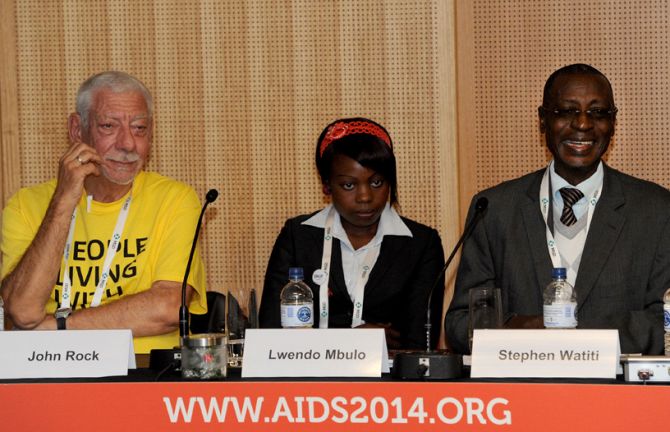
John Rock, Lwendo Mbulo and Stephen Watiti at the Global Village panel discussion Twenty Plus Positives Dialogues: People Who Have Lived with HIV for 20 Years or More during the AIDS 2014 conference in Melbourne on 22 July 2014.
Update
AIDS 2014: addressing the needs of people who have lived with HIV for more than 20 years
22 July 2014
22 July 2014 22 July 2014With the AIDS epidemic having entered its fourth decade, and given the wider availability of life-saving treatment, there is now a growing number of people who have been living with HIV for 20 years or more. Some have been born with the virus and are surviving into adulthood, while others are members of an ageing HIV population. According to a panel discussion that took place on 22 July at AIDS 2014, much more must be done to include the needs and concerns of both groups in a comprehensive AIDS response.
The UNAIDS organized event, Twenty Plus Positive Dialogues, focused on the lives and experiences of several panellists who have been living with HIV for decades and debated emerging issues.
Stephen Watiti, a 60-year-old Ugandan medical doctor who has been living with the virus for more than 25 years is one of the world’s 3.6 million HIV-positive people aged over 50. He spoke of his concerns about the disease as he grows older, such as the long-term side-effects of being on treatment for 20, 30 or 40 years and how to cope with non-communicable diseases, such as diabetes, that may also hit people living with HIV as they age.
Lwendo Mbulo, a 23-year-old Zambian activist who was born with HIV and is now the mother of an HIV-negative child, championed greater access to prevention of mother-to-child HIV transmission services, including family planning services. She also supported comprehensive reproductive health interventions for young people and increased social protection focused on children born to HIV-affected families.
A 70-year-old gay man, John Rock, stressed how your birthplace can be a determinant for accessing HIV services.
The participants agreed that it was time to adapt to the changing profile of an increasingly complex AIDS epidemic. It was argued that in a life cycle approach people can be reached with a spectrum of HIV prevention, treatment, care and support services throughout their lives.
Quotes
"How as policy-makers do we continue to ensure that all people living with HIV continue to live a quality life? We haven't really done a good job of dealing with the non-biological aspect of people living with HIV, such as depression, sex life, employment, etc."
"When I found out I was HIV-positive my dreams were shattered. Little did I know that with HIV I could stand with the youth as a voice for HIV."
"I am alive today, 30 years since I think I contracted HIV, largely because of the very good HIV treatment I get here in Australia. I believe everyone, regardless of where they are located, should be able to get quality HIV treatment."
"What has always drawn me into working on this disease and finding a cure is the power and inspiration of people living with HIV. Your voices have pushed us, told us what wasn't working and that you needed more."
"Today, babies continue to be born with HIV and our hope is that they continue to grow for many years. As they get older, their needs will grow and we want to ensure we are there to provide support every step of the way."
Related

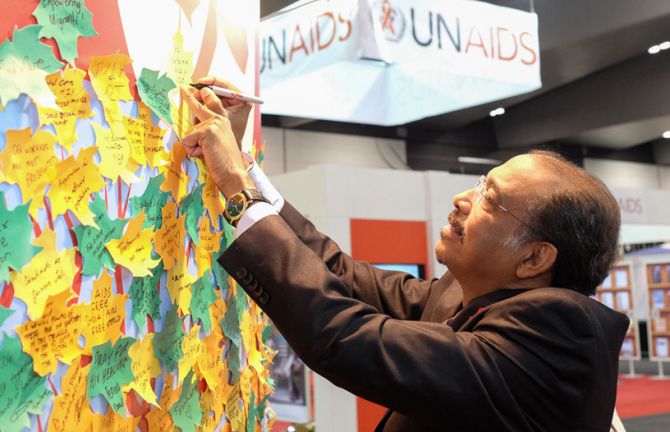
Update
AIDS 2014: galvanizing a movement for ending the AIDS epidemic by 2030
21 July 2014
21 July 2014 21 July 2014According to UNAIDS Executive Director Michel Sidibé, the 20th International AIDS Conference could spark a “Melbourne moment” and ignite a global movement to end the HIV epidemic as a public health threat by 2030.
Mr Sidibé was speaking at a conference symposium that explored the positioning of HIV in the post-2015 development agenda, at which emphasis was put on renewed political leadership and a mobilized civil society working to ensure that, within a generation, AIDS will no longer represent a significant risk to any population or country.
The gathering brought together heads of international agencies, including Mark Dybul, the Executive Director of the Global Fund to Fight AIDS, Tuberculosis and Malaria, civil society representatives, including singer and activist Yvonne Chaka Chaka, and political leaders, such as former President of Botswana Festus Mogae.
They agreed that despite unprecedented progress there was little room for complacency regarding the gains of the AIDS response and that, with ending the epidemic now a definable and realistic goal, there was no time to lose.
It was argued that ending the AIDS epidemic can only be achieved by focusing efforts on where the epidemic is located and through a rights-based prism that challenges the socioeconomic determinants of the epidemic and leaves no one behind. Participants concluded that there was no better way to reflect the theme of AIDS 2014, “Stepping up the pace”, than to strive to end the epidemic by 2030.
Quotes
"Ending AIDS is an opportunity for this generation. We should not miss it. It could be the biggest victory of this century."
"If we don't act collectively, effectively and comprehensively we will repeat the past. In the post-2015 development agenda AIDS should remain one of the main objectives."
"We need human rights when we talk about AIDS. We need to educate our people, the youth and those who are vulnerable to HIV."
"To galvanize a movement you need a compelling story of what's possible and how to do it. And then you have to deliver."
Related

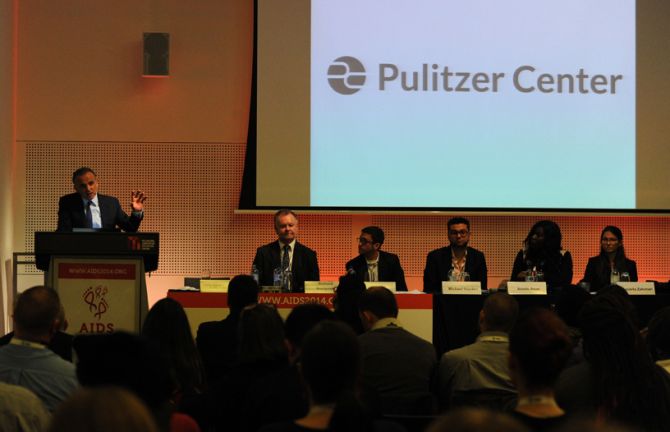
Harnessing the power and reach of the media to challenge HIV-related stigma and discrimination and champion human rights has long been a goal of the AIDS response. At this week’s 20th International AIDS Conference in Melbourne, Australia, UNAIDS and the Pulitzer Centre co-hosted an event to explore exactly how this can be done.
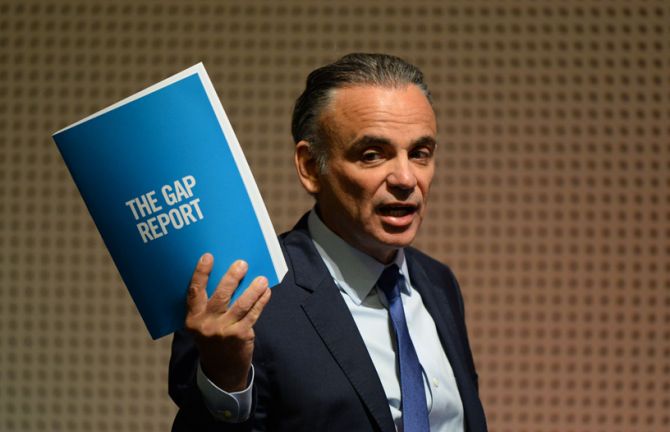
Harnessing the power and reach of the media to challenge HIV-related stigma and discrimination and champion human rights has long been a goal of the AIDS response. At this week’s 20th International AIDS Conference in Melbourne, Australia, UNAIDS and the Pulitzer Centre co-hosted an event to explore exactly how this can be done.
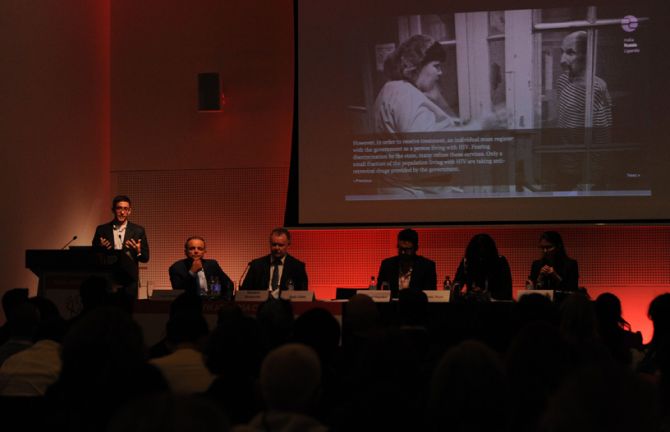
Harnessing the power and reach of the media to challenge HIV-related stigma and discrimination and champion human rights has long been a goal of the AIDS response. At this week’s 20th International AIDS Conference in Melbourne, Australia, UNAIDS and the Pulitzer Center on Crisis Reporting cohosted an event to explore exactly how this can be done.
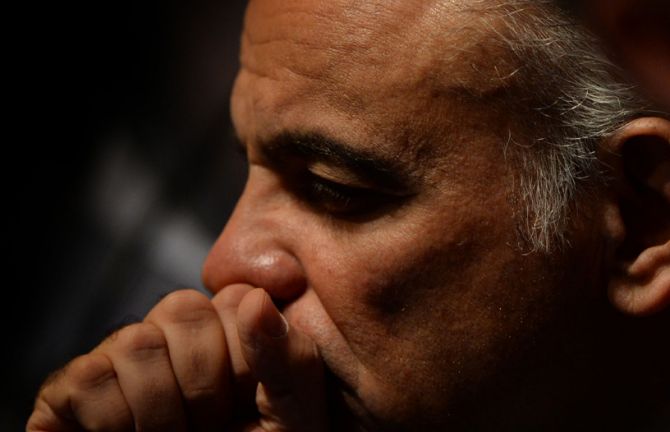
Harnessing the power and reach of the media to challenge HIV-related stigma and discrimination and champion human rights has long been a goal of the AIDS response. At this week’s 20th International AIDS Conference in Melbourne, Australia, UNAIDS and the Pulitzer Center on Crisis Reporting cohosted an event to explore exactly how this can be done.
Update
Journalists putting the dual crisis of HIV and human rights firmly on the agenda
21 July 2014
21 July 2014 21 July 2014Harnessing the power and reach of the media to challenge HIV-related stigma and discrimination and champion human rights has long been a goal of the AIDS response. At this week’s 20th International AIDS Conference in Melbourne, Australia, UNAIDS and the Pulitzer Center on Crisis Reporting cohosted an event to explore exactly how this can be done.
During the 21 July meeting, entitled The Dual Crisis: HIV and Human Rights, participants debated the key issues involved in producing reports, features and documentaries that deal in a balanced, informative and compassionate way with key populations most affected by HIV. Invited journalists, who had received grants from the Pulitzer Center to complete their work, discussed their experiences of creating material in collaboration with such communities, including lesbian, gay, bisexual and transgender people in Uganda, transgender women in India and women living with HIV in northern Nigeria.
The participants explored the ethical dilemmas that can emerge, such as how to share the stories of affected and stigmatized groups in their work while at the same time accepting that individuals could face further discrimination as a result of this exposure.
The Pulitzer Center also presented a new interactive data visualization showing a collection of case studies of several key populations around the world. The project aims to explore how the media might use these vivid narratives to promote greater understanding of the lives and needs of the most affected, and often most marginalized, communities.
Quotes
"The issue is not HIV. What is holding us back is discrimination. The only way forward is to transform society. But how can we influence society to change? For that we need people and we need journalists."
"We are not trying to produce academic work. We are trying to provide a brief window into the lives of people with HIV, trying to promote emotional understanding of key populations."
"We have been great at presenting the statistics but not at conveying their emotions."
"As a journalist, I think it is important to tell both sides of the story."

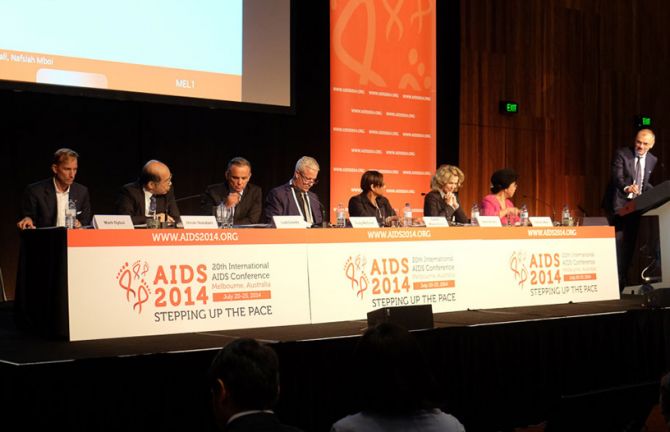
The Global Health Sector Strategy on HIV/AIDS 2011–2015, adopted by World Health Organization Member States in 2011, provides an ambitious framework for the health sector response to HIV.
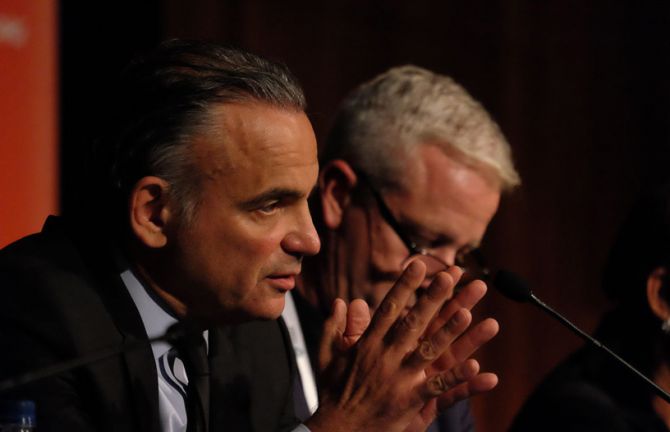
The Global Health Sector Strategy on HIV/AIDS 2011–2015, adopted by World Health Organization Member States in 2011, provides an ambitious framework for the health sector response to HIV.
Update
Taking the pulse: WHO global update on the HIV health sector response
20 July 2014
20 July 2014 20 July 2014The Global Health Sector Strategy on HIV/AIDS 2011–2015, adopted by World Health Organization Member States in 2011, provides an ambitious framework for the health sector response to HIV. As the 2015 deadline approaches, what has been achieved so far? This critical question was addressed during a high-level session at the International AIDS Conference in Melbourne, Australia.
The participants recognized the huge progress made in the response to HIV in the past three years: the numbers of new HIV infections and AIDS-related deaths have fallen faster than ever before and there has been a dramatic growth in HIV treatment coverage, alongside great strides made in the elimination of mother-to-child transmission of HIV. Service quality and broader health outcomes were said to have improved following new and innovative policies and guidance on HIV prevention, diagnosis and treatment.
Examples of advances were provided from a number of countries, including Viet Nam, which is spearheading a significant treatment scale-up, and Zimbabwe, seen as a major success story in expanding access to elimination of mother-to-child HIV transmission services.
However, it was acknowledged that considerable challenges remain, such as low treatment coverage in some regions, too few people knowing their HIV status, too many presenting for testing and treatment at a very late stage, and key populations not having access to the services they need.
During a closing discussion, civil society and development partners explored how to tackle the challenges that remain and build on hard-won achievements to ensure that the AIDS response is effective, equitable and leaves no one behind.
Quotes
"We need to transform global goals into clear targets that make sense to people and communities."
"We cannot be isolated. We have to be integrated into other health issues to achieve greater outcomes."

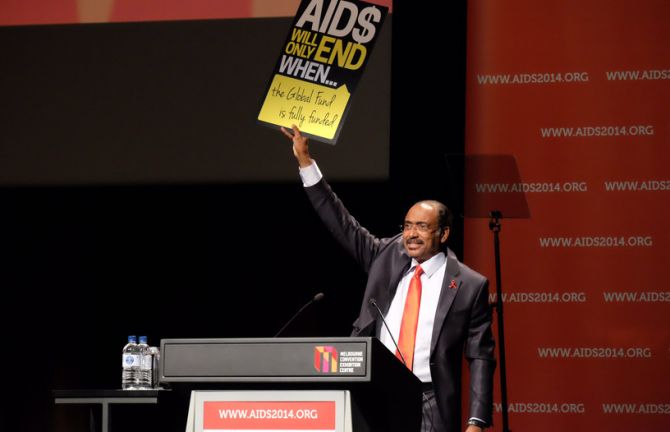
UNAIDS Executive Director Michel Sidibé speaking at the opening ceremony of the AIDS 2014 conference in Melbourne, Australia, 20 July 2014.
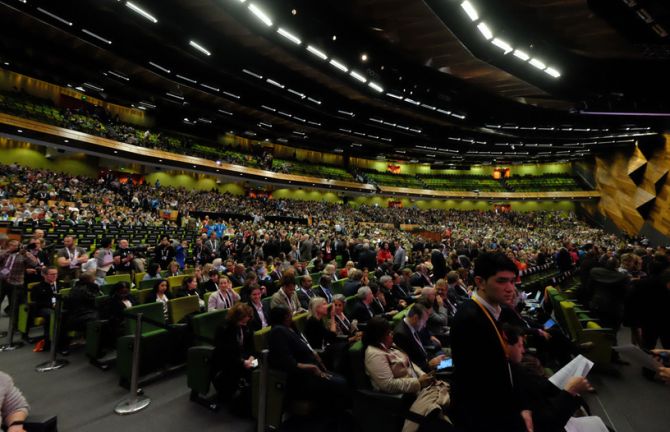
Opening ceremony of the AIDS 2014 conference in Melbourne, Australia, 20 July 2014.
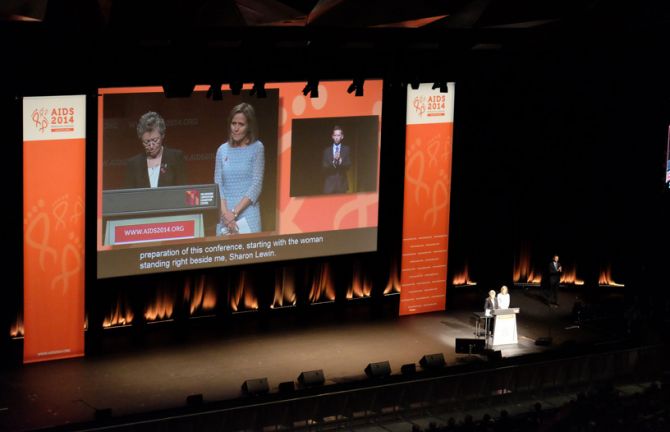
Opening ceremony of the AIDS 2014 conference in Melbourne, Australia, 20 July 2014.
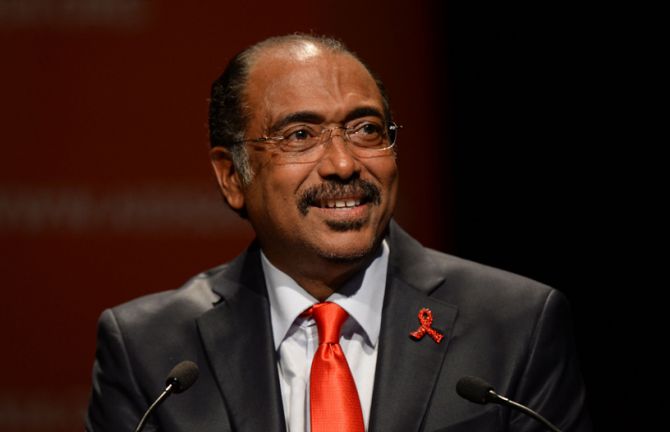
Opening ceremony of the AIDS 2014 conference in Melbourne, Australia, 20 July 2014.

Opening ceremony of the AIDS 2014 conference in Melbourne, Australia, 20 July 2014.
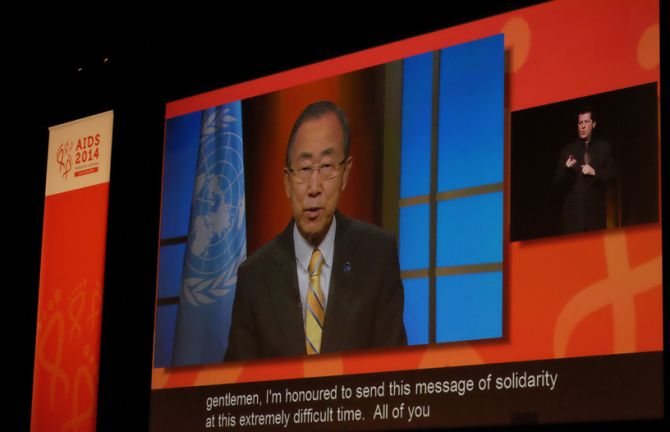
Opening ceremony of the AIDS 2014 conference in Melbourne, Australia, 20 July 2014.

Opening ceremony of the AIDS 2014 conference in Melbourne, Australia, 20 July 2014.
Feature Story
Opening ceremony honours missing delegates and calls for ending AIDS by 2030
20 July 2014
20 July 2014 20 July 2014The 20th International AIDS Conference opened in Melbourne, Australia, on 20 July 2014 with a moving and powerful range of statements from leading figures in the response to HIV. The ceremony was dedicated to the memory of the victims lost in the international tragedy—several of whom were on their way to participate in AIDS 2014.
Nobel laureate and President of the International AIDS Society Professor Françoise Barré-Sinoussi paid tribute to the friends and colleagues who died. “We dedicate AIDS 2014 to them, we will remember their legacy and keep them in our hearts,” she said.
Michel Sidibé, Executive Director of UNAIDS, gave an inspiring address calling for an end to the AIDS epidemic by 2030 and stressed the need for a new “catch-up” plan to leave no one behind. “Now, more than ever, we must concentrate our limited resources on where most infections occur and on where most people die,” he said. “The world needs a new “catch-up” plan for the 15 countries that account for 75% of new HIV infections.”
UNAIDS Goodwill Ambassador and Master of Ceremony James Chau guided the speakers through the special memorial opening session. He extended a warm welcome to Ayu Oktariani, a young woman living with HIV from Indonesia, who spoke passionately about the challenges she faces in her daily life, “Living with HIV is not easy,” she said. “It's not only about HIV; it's about people’s judgement of my sexual behaviour.” She talked about discriminatory attitudes of health-care workers and the lack of information on sexual and reproductive health. “Many of us have HIV because we did not have the means or information to protect ourselves,” she added.
Co-chair of AIDS 2014 Professor Sharon Lewin told the participants how important the conference was to Australia and the world. A sentiment echoed by the Premier of the State of Victoria, Denis Napthine, “This conference is about stepping up the pace, making a difference and making the world a better place,” he said.
Aboriginal Elder Joy Wandin Murphy extended a warm welcome to Australia to all the participants. She talked about the country’s past struggles and stressed the importance of tolerance and acceptance. “If we understand each other we can live in harmony, and, if we do, we can eliminate stigma and discrimination so we can all live together.”
The Jonathan Mann memorial lecture was given by Justice Michael Kirby, who strongly emphasized the importance of equality and justice for all. He talked about the impact of punitive laws and the devastating impact they can have on people living with and affected by HIV. He stressed that, “Law and policy must be made part of the solution and not part of the problem for AIDS.”
The United Nations Secretary-General Ban-Ki moon and the Prime Minister of Australia Anthony Abbott delivered video messages expressing their sorrow for all who died on flight MH17 and encouraged participants to take the opportunity provided by the conference to advance the response and reach the end of the AIDS epidemic.
Deputy Prime Minister of Australia Warren Truss stated that Australia will pursue an ambitious commitment to ending AIDS as part of the post-2015 agenda. The event was closed by a concert from Dan Sultan.
The 20th International AIDS Conference will run from 20 to 25 July in Melbourne, Australia. The delegates will review and present the latest scientific findings as well as the social and structural innovations and challenges in the AIDS response.
Related
Documents
The last climb: ending AIDS, leaving no one behind
20 July 2014
My friends, let us not leave Melbourne thinking that it will be easy to reach the summit. Complacency will cause us to stumble. Will future generations say that we squandered the opportunity of a lifetime? I know the path will be steep and the obstacles many. Let us do this in memory of our colleagues who died en route to Melbourne and the millions who have died of AIDS-related illnesses and of the tens of millions of people living with HIV. If every person here tonight, and everyone working to end the epidemic, acts with the same sense of urgency, the same hope and the same commitment to fight for those left behind, we will scale this mountain. But only if we go arm in arm will we reach the top and the end.

